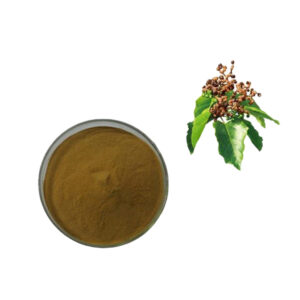Hovenia acerba Lindl.
-Plant extracts
1.High quality plant extracts;
2.Organic and Natural;
3.Better stability.
Share the product
Product information

Introduction
Hovenia dulcis is a deciduous tree of the genus Hovenia of the Rhamnaceae family, also known as jujube, chicken claw pear, etc. It is distributed in most parts of China, mostly growing on the edge of hillside forests or in sparse forests.
Ingredients
Polysaccharides: Hovenia dulcis fruits and seeds contain a variety of polysaccharides, which have certain biological activities and may have positive effects on human health.
Flavonoids: Including flavonoid compounds such as quercetin and kaempferol, which have multiple pharmacological activities such as antioxidant and anti-inflammatory.
Triterpenes: Triterpenoid components such as Hovenia dulcis saponins are one of the important material bases for the medicinal effects of Hovenia dulcis, and have sedative, hypnotic, and alcohol detoxification effects.
Other ingredients: It also contains rich organic acids, alkaloids, volatile oils and trace elements, which together constitute the unique chemical composition and biological activity of Hovenia dulcis.
Advantages
Medical and edible: Hovenia dulcis can be eaten directly as a fruit, and its fruit stalk is sweet and delicious, rich in nutrition; it also has medicinal value and can be used to treat a variety of diseases. It is a medicinal and edible plant with broad application prospects.
Natural health care: Most of the ingredients contained are natural compounds, which are relatively safe and have unique advantages in health care and treatment, meeting people’s demand for natural and green products.
Rich resources: It is widely distributed in China and its resources are relatively rich, providing a good material basis for its development and utilization, and has high economic development potential.
Application
Food field: Hovenia dulcis fruit can be eaten fresh, and its fruit stalk can be made into candied fruit, preserved fruit, jam and other foods, and can also be used for winemaking, vinegar making, etc., enriching the types and flavors of food.
Other fields: The wood of Hovenia dulcis can be used to make furniture, agricultural tools, etc.; its plants also have certain ornamental value and can be used in garden landscape design. In addition, Hovenia dulcis also plays an important role in ecological protection, by conserving water and soil and improving the ecological environment.


